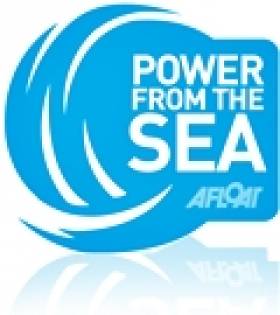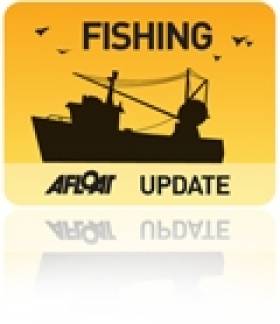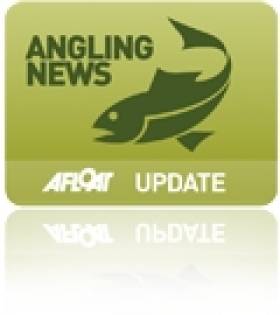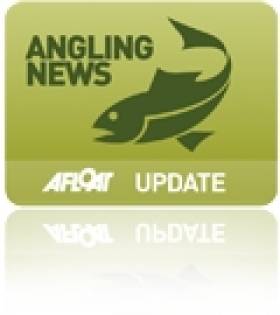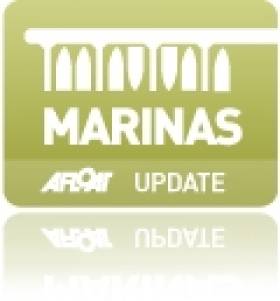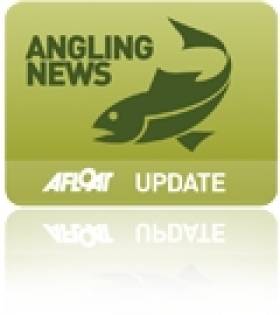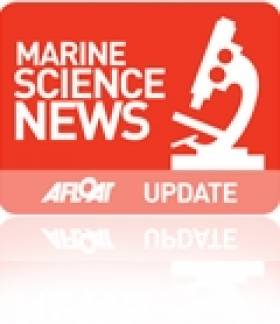Displaying items by tag: Funding
Marine Researchers Brave Elements For Workshop On Cross-Cutting Opportunities In EU Funding
#MarineScience - More than 60 marine researchers from third level institutes, Government agencies and SMEs braved the elements to get to the Marine Institute in Oranmore on Thursday 7 January for information and advice on the many EU funding opportunities for marine research.
The workshop – titled Cross Cutting Marine Opportunities in EU Funding, as previously reported on Afloat.ie – was organised by the Marine Institute’s Research Office.
Welcoming participants, John Evans, director of policy, innovation and research at the Marine Institute, highlighted the success of Ireland’s marine researchers to date in winning competitive EU funding.
“Irish researchers have won 3.6% of the available funding for Blue Growth topics under the most recent round of results announced by the European Commission for Horizon 2020 Societal Challenge 2, and this rises to 4.6% when marine related topics relating to sustainable food security are considered," he said.
"This is becoming a consistent pattern, with Irish marine researchers winning more European competitive funding than would be expected from a country our size.”
Evans also spoke of the need for a focus on national research collaboration to maintain and improve this competitive position, and the importance of relevant national strategies as tools for researchers preparing funding proposals, specifically Harnessing Our Ocean Wealth – An Integrated Marine Plan for Ireland, and the National Strategy for Science, Technology and Innovation 2015-2020.
The Marine Institute's Dr Fiona Grant, national contact point for marine aspects of Horizon 2020 Societal Challenge 2, gave an overview of the priority topics for Blue Growth with a total of €148.5m available funding with contributions from the Climate, Energy and Transport parts of the Horizon 2020 programme.
'Linking healthy oceans and seas with healthy people’ was one of the key topics covered. Dr Grant mentioned the concept of the ocean as a "blue gym", citing a recent European Marine Board position paper that shows the significant impact of the oceans on human health and wellbeing.
Dr Sean McCarthy of Hyperion Ltd gave very practical advice on how to write a competitive Horizon 2020 proposal, with lots of insights for both new and experienced funding applicants. He told scientists to focus on the potential impact of the research proposal.
“Begin your proposal with impact – the impact is the big issue. Then write the science around the impact,” he said.
Other advice from Dr McCarthy included contacting the national contact point to ensure a better success rate.
“When writing your proposal it’s important to understand how the research priorities have been selected and the national contact point can give you insight into this,” he added.
Gerry Finn, director of the Northern and Western Regional Assembly and national contact point for the INTERREG Atlantic Area, gave an overview of the INTERREG Atlantic Area Programme 2014-2020 and success stories from the 2007-2013 ERDF programmes., under which €12.9m in ERDF funding was approved to 56 Irish projects.
Also speaking on the day was Michael O’Brien, EU Programme liaison officer, who gave an overview of eligibility criteria and guidelines on what makes a successful proposal under this financing mechanism. Four priority areas have been identified which include:
- Stimulating innovation and competitiveness.
- Fostering resource efficiency.
- Strengthening the territory’s resilience to risks of natural, climate and human origin.
- Enhancing biodiversity and the natural and cultural assets.
Over €140m will be available under the call from 2014-2020 which is expected to be launched in the middle of 2016.
O’Brien advised that the technical parameters "are not formally agreed yet by the member states and there may be further changes over the coming weeks. The working group for the programme meets again shortly to advance the progress on the programme manual and application process.”
Marine Wildlife Welfare Groups Share In €2.5M Funding Boost
#MarineWildlife - Marine wildlife welfare groups will received €27,000 out of more than €2.5 million awarded to 140 animal welfare organisations nationwide by the Department of Agriculture, Food and the Marine.
Seal Rescue Ireland, based at Courtown Harbour in Co Wexford, will receive €12,000, while €5,000 apiece will go to Galway & Claddagh Swan Rescue, the Irish Seal Sanctuary in Garristown, Co Dublin and the Irish Whale and Dolphin Group in Kilrush, Co Clare.
Making the announcement at the Irish Blue Cross Clinic in Inchicore on Friday 18 December, Marine Minister Simon Coveney said that these organisations "make a tremendous contribution to the welfare of animals, in particular, by educating the public on best practice, by making effective interventions where appropriate and providing facilities for at-risk animals.
"The increase in workload for animal welfare bodies due to new animal welfare legislation, including the new dog microchipping legislation, and the continuing albeit decreasing reporting of incidences of animal neglect to the department’s animal welfare helpline, clearly demonstrates a need to assist animal welfare organisations in their important work.
"I am pleased therefore to be in a position to increase funding to animal welfare organisations for the fifth consecutive year."
The minister added that he and his department would continue to work closely with animal welfare groups. He reminded the public of the dedicated email address ([email protected]) and helpline (01 607 2379 or Call Save 0761 064408) in operation in the Department of Agriculture, Food and the Marine for members of the public to report incidents of animal cruelty. The helpline will be monitored regularly over the holiday period.
Lynch Appeals Again For Rio Laser Trials Support
#Rio2016 - The National Yacht Club's Finn Lynch is urgently appealing for donations to fund his trip to the upcoming Olympic trials in Rio.
With the Irish Sailing Association (ISA) citing cost reasons for its decision not to bring boats to the next trail event at next summer's Olympic sailing venue, Lynch has yet again been moved to seek the support of family, friends and Ireland's sailing community.
It comes just months after a previous appeal that enabled him to secure invaluable training with Olympic gold medallists in Croatia.
The Laser sailor will need to charter his own boat for the trials which, along with flights, food and accommodation, will put his bill at around €10,000.
The NYC has more on Lynch's latest appeal HERE.
Marine Energy Activities Boosted With Extra €4.2m in EU Funding
#powerfromthesea – Minister for Communications, Energy & Natural Resources Alex White T.D. welcomed the announcement that the SFI Centre for Marine Renewable Energy Ireland (MaREI) had successfully raised an additional €4.2 million in funding from EU research funds for marine energy activities.
The announcement of the substantial EU funding was made to an audience of more than 130 industry and university representatives involved in a variety of marine energy research projects, attending the MaREI Industry Open Day at the National Maritime College of Ireland in Cork.
"I want to commend MaREI on their success in securing substantial EU support to fund their very important research and development work. It is truly laying the foundations for both the energy system and economic opportunity of the future."
Speaking at the MaREI Industry Open Day, Prof. Mark Ferguson, Director General Science Foundation Ireland (SFI) and Chief Scientific Adviser to the Government of Ireland added, "MaREI is one of twelve SFI Research Centres of excellence and impact in Ireland. Research undertaken at MaREI is positioning Ireland to play a leading role in marine renewable energy research which is an area of significant national strategic importance. In its first year MaREI has delivered on the targets which we have set. I look forward to a successful year ahead for MaREI, in terms of new industry partnerships, leveraging funding and new discoveries that will deliver solutions that can benefit both Irish society and the economy."
Prof. Conchúr Ó Brádaigh, Director of the MaREI Centre said that "Large and small companies alike are engaging with MaREI across a huge variety of business opportunities from marine robotics and new materials to endure ocean conditions, to offshore wind, wave and marine energy and mooring devices as well as aquaculture and grid technology solutions. The additional funding from the EU will serve to further position MaREI at the forefront of marine renewable research and commercialisation of this research globally."
The industry-academia MaREI Centre comprises over 45 industry partners, including global market leaders in energy, marine technology, software and hardware providers. Academic partners include lead partner University College Cork along with Cork Institute of Technology, University of Limerick, NUI Galway, NUI Maynooth, University College Dublin and the Marine Institute.
"MaREI will directly create companies and jobs and serve as a catalyst for Ireland to establish a safe, sustainable and profitable energy supply for domestic use and for export," said Professor Anita Maguire, Vice-President for Research and Innovation at University College Cork.
Minister Alex White also toured the €15 million UCC Beaufort building, performing the customary "topping out" ceremony, which marks the final phase of building works. Beaufort will house the MaREI centre on its completion in July 2015.
The MaREI Centre initially received government support of €19 million through Science Foundation Ireland (SFI) and a further €10.5 million investment from industry partners. The Centre supports job creation in the in marine renewables sector, while also making Ireland an international focus for the marine energy industry. Almost 90 jobs in the field of marine energy and maritime projects were recently announced by Minister for Agriculture, Food, Marine and Defence Simon Coveney, T.D. for the Cork Harbour region, and MaREI is heavily involved in supporting these companies and the related jobs.
Brussels Reaches Agreement On European Fisheries Fund
#Fishing - Draft rules for allocating European Maritime and Fisheries Fund (EMFF) aid to help fishermen comply with the new Common Fisheries Policy (CFP) requirements were informally agreed late last month, after several three-way meetings between European Parliament, Council and Commission.
The rules should now be approved at the first reading, before the end of the current parliament.
"This was the final chapter of the negotiations," said rapporteur Alain Cadec. "With the political agreement reached tonight we will have an ambitious European Maritime and Fisheries Fund for 2014-2020. This is a real victory for the European Parliament, which was heeded by the Council and the Commission.
"The tug of war between the institutions in December allowed Parliament to return to the negotiating table with a strong position and reach a very satisfactory agreement regarding in particular the financial breakdown and engine renewal."
Parliament’s negotiators improved the Commission proposal, especially on collecting and managing fisheries data, which are needed for example, to set the Maximum Sustainable Yield required by the new CFP rules (MSY, meaning the largest catch that can be safely taken year after year and which maintains the fish population size at maximum productivity).
MEPs ensured that €520 million - a considerable increase over the original Commission proposal - of the EMFF budget will be earmarked for data collection.
Another negotiating success for Parliament was to require each member state with a significant small-scale coastal fishing fleet to table an action plan setting out a strategy for the development, competitiveness and sustainability of these fisheries, which play a key role in ensuring the vitality of coastal areas.
MEPs also amended the EMFF proposal to allow fishermen under 40 years old to be granted up to €75,000 in individual start-up support if they buy a small-scale and coastal fishing vessel between 5 and 30 years old and have five years' professional experience in the sector.
In addition, Parliament added EMFF support for withdrawing, replacing or modernising engines for vessels up to 24 metres long, including an requirement for those of 12-24 metres that the new engine's power output be less than that of the engine it replaces. However, an amendment to reintroduce fleet renewal subsidies was rejected.
To give effect to Parliament's agreement with the Council on the forthcoming CFP, which obliges member states to set sustainable fishing quotas from 2015 and introduces a ban on discarding unwanted fish, the EMFF will help fishermen to comply with the new rules by supporting investments in more selective fishing gear or equipment to facilitate handling, landing and storage of unwanted catches.
EMFF aid will also be used to improve safety and working conditions, data collection and port infrastructure.
After a plenary vote in October to open negotiations with the Council, the agreement will now be put to a vote in the Fisheries Committee before seeking final approval by the full House in April.
New Funding For Fisheries Development Projects
#Angling - More than €400,000 has been made available to conserve and develop Ireland's inland fisheries resource by Minister of State Fergus O'Dowd, as he announced the opening of applications for the 2014 Salmon Conservation Fund(SCF), Midland Fisheries Fund (MFF) and new Co-op Funds.
The three Inland Fisheries Ireland (IFI) schemes facilitate clubs, fishery owners, commercial salmon fishers and other organisations to undertake works to improve habitat, stocks, access, invasive species management, angling, etc under its supervision and direction.
IFI says these works are important in maintaining and improving capacity within the inland fisheries resource which is estimated to contribute €755 million annually to the Irish economy.
Announcing the schemes, Minister O’ Dowd said: "The inland fisheries sector is fortunate to have such an engaged stakeholder cohort and I am pleased to be able to support IFI in making these funds available to them to allow for ground up, managed sustainable development.
"Unfortunately the Co-op Funds Scheme is only a once-off opportunity, while the other funds will have to be reviewed on an annual basis.
"I encourage all those interested in fisheries to investigate the possibilities under the various schemes to conserve, develop and promote the resources in their care for the betterment of angling, the inland fisheries resource itself and Ireland's economy."
The new Co-op Funds, which will be available for 2014 only, comprise the various funds remitted to IFI on the dissolution of the Trout and Coarse Fish Development Societies. The funds will be distributed back to the regions from which they came. A total of €160,000 is available, with over €130,000 specifically for the old Southern Regional Fisheries Board area.
The Salmon Conservation Scheme is now seven years in existence and has allocated funding to 145 salmon projects all around Ireland. A total of €200,000 is available for distribution under the scheme in 2014.
The Midland Fisheries Fund, which ran as a pilot scheme in 2013, has seen nine projects undertaken in the midland area developing angling resources, supporting scientific research and conserving fisheries habitat. A further €50,000 is available under this scheme for 2014.
Salmon Conservation Fund Contributors Scheme Open To Submissions
#SalmonFund - Angling clubs, commercial fishermen, fishery owners, riparian owners and landowners with an interest in a salmon fishery are invited to submit projects to the Salmon Conservation Fund 2013/14 Contributors Scheme.
An initial fund of €200,000 is available in 2014 for distribution to contributors. Approved project applications may be fully or partly funded. It is envisaged that the fund will be divided between a range of contributors to a guide of €15,000 per project.
The list of what can be funded under the scheme includes:
- Fish passage improvement (eg removal of barriers, modification of weirs, and construction of fish passes, etc)
- Spawning enhancement (addition/raking of gravel or cleaning of existing substrates)
- Instream structures (weirs, deflectors, rubble mats, random boulders, etc)
- River bank protection (rock armour, log revetment etc)
- Fencing (protection of river banks including fences, stiles, cattle drinks, etc)
- Riparian zone improvement (tree pruning and strategic tree planting)
- Removal and control of exotic invasives (eg Rhododendron, Japanese knotweed, Asian clam, chub, etc)
- Feasibility studies (that lead to future projects under the above headings to maximum of 50% funding or €2,000, whichever is less; a maximum of five 5 studies only to be allowed)
For further details on the scheme, how to apply, an application form and more see HERE.
Waterford Marinas Get Funding For Upgrades
#IrishMarinas - Three marinas in Waterford are due for upgrades after Marine Minister Simon Coveney gave approval for nearly half a million euro for capital works projects in the sector.
As Build.ie reports, the funding will go towards three schemes to improve marine leisure and tourism infrastructure in Tramore, Abbeyside in Dungarvan and Boatstrand, covering 75% of costs - with the remainder to be sourced by Waterford County Council.
The announcement follows funding allocations earlier this year for urgent remedial works at six regional harbours, and further harbour improvement projects in Co Clare.
Build.ie has more on the story HERE.
€50K Funding For Midlands Angling Clubs
#Angling - Angling clubs and community development groups in the Midlands Fishery Group Permit Area will share funding of €50,000 this year to carry out sustainable fishery development projects.
The Midland Fisheries Fund (MFF) was created by Inland Fisheries Ireland (IFI) from angler contributions set aside from the permit income received by IFI in the Midlands Fisheries Group permit area.
This year, funding will be awarded to eight sustainable angling development projects ranging from the development of access for anglers with disabilities to river rehabilitation and provision of shallow water marker buoys on midlands waterways.
IFI said it was thrilled at the great response received to this, the pilot year of the MFF. A wide range of fishery projects were applied for and the top eight proposals will share the available funding of €50,000.
Among the successful applicants were Lough Owel Trout Preservation Association, Kilconnell Community Development Association Ltd, Inny Anglers Development Association, Lough Sheelin Trout Protection Association, Ballinlough and District Angling Club, Pallas Lake Fly Fishing Club and Lough Derravarragh Angling Association.
The MFF is exclusive to the Midland Fisheries Group area and is only open to clubs in that area. This scheme, which is similar in design to the Salmon Conservation Fund, will allow for habitat improvement but importantly also includes angling development projects.
The successful applicants will be provided with technical assistance to help their projects become a reality.
"This fund reaffirms IFI’s objective to facilitate stakeholders to undertake sustainable development works," said Fergus O’Dowd, Minister of State with responsibility for Natural Resources. "These works will enhance and improve fisheries habitats and angling tourism potential and the contribution the inland fisheries resource makes to the economy.
"This scheme encapsulates the partnership approach between IFI and its stakeholders, ensuring projects are environmentally sustainable, undertaken with the appropriate permissions and guidance and developed by local angling clubs for the benefit of locals and tourists alike."
IFI chief Ciaran Byrne added: "It was clear from the large number of applications we received that anglers in the Midland Fisheries Permit Area are very keen to invest these funds, created from angler contributions, back into these fisheries.
"I’m very happy with the wide range of successful projects this year and wish the clubs all the best with their development work."
Calls Now Open For Marine Reaearch Funding Under EUROFLEETS2
#MarineScience - Applications are now being invited under EUROFLEETS2, an EU-funded project providing scientists with 200 fully funded days of ship-time and 104 fully funded days of marine equipment to carry out ship-based research activities within any field of marine sciences.
EUROFLEETS2 - which had its kick-off meeting gathering more than 60 marine scientists and fleet operators in April this year - aims to bring together the European research fleets to enhance their co-ordination and promote the cost effective use of their facilities.
The Marine Institute’s research vessels, the RV Celtic Explorer and the RV Celtic Voyager, are both available to researchers through the EUROFLEETS ship-time call. Irish researchers can apply for ship-time on these and other European vessels participating in EUROFLEETS2.
EUROFLEETS2 invites applications for the following marine research funding opportunities:
Super-Integration: This call seeks to fund a truly cross-cutting proposal, multidisciplinary, multiyear and/or multiplatform, which needs to mobilise a combination of EUROFLEETS Research Vessels (RVs) together with other appropriate scientific tools like nationals RVs, research planes or onshore infrastructures with their own EC or national funding. All EUROFLEETS RVs and equipment are available for this call. More information at www.eurofleets.eu/np4/59
Embarked Equipment: This call offers fully funded marine equipment time within participating scientific marine equipment (two 3D HD TV cameras, two ROVs and the sea floor drill rig MARUM-Mebo) to be deployed from RVs or from underwater vehicles funded by other sources than EUROFLEETS2. More information at www.eurofleets.eu/np4/60
The application deadline for both funding opportunities is 16 September 2013.
EUROFLEETS2 is a Research Infrastructures project under the seventh Framework Programme of the European Commission. For more information and eligibility criteria visit www.eurofleets.eu.



























